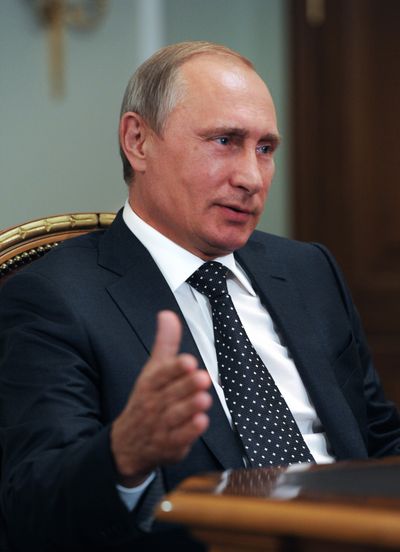Russia’s Putin promises new weapons to fend Western threats

MOSCOW – Russia will counter military moves by the U.S. and NATO with an array of new nuclear and conventional weapons, President Vladimir Putin said Wednesday as the military successfully test-fired an intercontinental ballistic missile from a nuclear submarine.
At the same time, he emphasized that Russia will not enter a new arms race and will tightly control its military budget to avoid overburdening the economy.
Putin accused the West of using the crisis in Ukraine to reinvigorate NATO, warning Moscow will ponder a response to the alliance’s decision to create a rapid-reaction “spearhead” force to protect Eastern Europe.
The statement appeared to signal that the Russian leader is determined to pursue a tough course in the face of more Western sanctions over the Ukraine crisis that has sent Russia-West relations plummeting to their lowest point since the Cold War.
Addressing a Kremlin meeting on weapons modernization, Putin ominously warned the West against getting “hysterical” about Moscow’s re-arming efforts, in view of U.S. missile defense plans and other decisions he said have challenged Russia’s security.
“We have warned many times that we would have to take corresponding countermeasures to ensure our security,” Putin said, adding that he would now take personal charge of the government commission overseeing military industries. “I would like to underline that we only take retaliatory steps.”
Putin claimed that some in the West would like to pull Russia into a new arms race, but “we will not enter such race, it’s absolutely excluded.”
He argued that Russia needs to upgrade its arsenals to replace Soviet-designed weapons approaching the end of their designated lifetime.
Putin’s comments came as the European Union was mulling a new wave of sanctions against Russia intended to persuade it to honor its part of a cease-fire agreement signed last week. A decision is expected later this week.
Putin said Russia’s weapons modernization program for 2016-25 should focus on building a new array of offensive weapons to provide a “guaranteed nuclear deterrent;” re-arming strategic and long-range aviation; creating an aerospace defense system and developing high-precision conventional weapons.
He would not elaborate on prospective weapons, but he and other officials have repeatedly boasted about new Russian nuclear missiles’ capability to penetrate any prospective missile shield.
The Kremlin has bolstered defense spending in the past few years under an ambitious weapons modernization program that runs through 2020 and costs the equivalent of $540 billion.
Russia inherited most of its arsenal from the Soviet Union and has struggled to develop new weapons systems after the post-Soviet industrial meltdown. With hundreds of subcontractors going out of production, Russian arms manufacturers often had to make components themselves, swelling costs and affecting production quality.
The difficulties faced by the Russian arms industry have been highlighted by the long and painful development of the Bulava intercontinental ballistic missile, which has suffered repeated launch failures.
Its designers finally seem to have cured the glitches, and the navy boasted of a successful launch of the Bulava from a nuclear submarine on Wednesday. Two more launches are set for the fall.
Putin’s emphasis on high-precision conventional weapons reflected government concerns about the U.S. and other NATO countries enjoying a significant edge in that area.
The comparative weakness of Russia’s conventional arsenals have prompted Russia to rely increasingly on a nuclear deterrent, with the nation’s military doctrine envisaging the possibility that Russia may use nuclear weapons first in response to a conventional aggression.
Talking about potential threats, the Russian president specifically pointed at the U.S. missile defense program and Washington’s plans to develop new conventional weapons that could strike targets anywhere in the world in as little as an hour with deadly precision.
Deputy Prime Minister Dmitry Rogozin, who is in charge of weapons industries, told reporters after the meeting that Russia will respond to the U.S. challenge by developing its strategic nuclear forces and aerospace defenses.